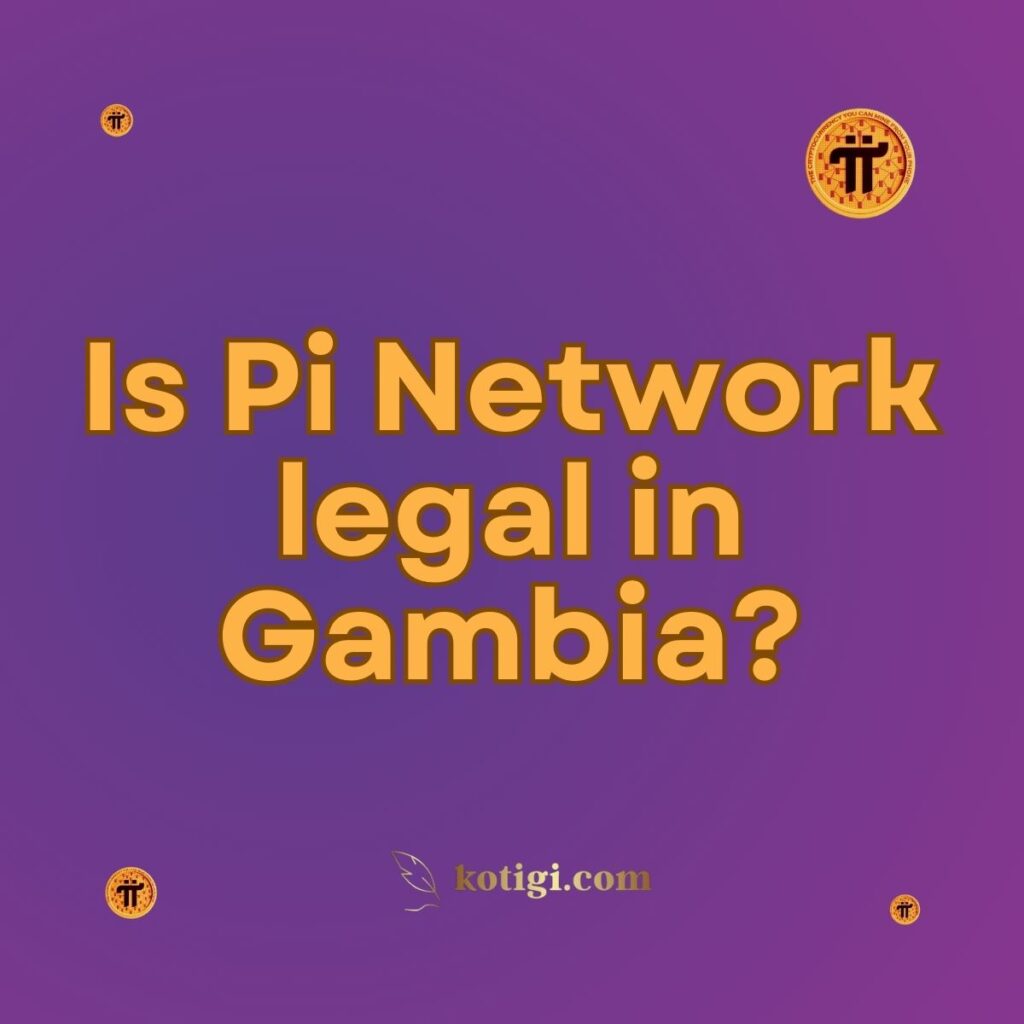
Is Pi Network legal in Gambia?
Yes, Pi Network is legal in Gambia. While there are no specific regulations governing the use of cryptocurrencies in the Gambia, Pi Network can be used as long as individuals comply with general financial laws and anti-money laundering (AML) guidelines.
Introduction
Pi Network’s global expansion has raised questions about its legality in various countries, including Gambia. Cryptocurrency adoption is increasing across Africa, with both opportunities and challenges for users in countries with emerging regulatory frameworks. In this article, we explore whether Pi Network is legal in Gambia, the current legal landscape, and what Gambians should be aware of when using the platform.
Overview of Cryptocurrency Regulations in Gambia
Gambia, like many African countries, has not yet developed a detailed regulatory framework specifically for cryptocurrencies. However, this does not mean that cryptocurrencies like Pi Network are illegal. As of now, there are no direct prohibitions against using or trading digital currencies in Gambia. This leaves space for platforms like Pi Network to operate legally, provided that users remain compliant with broader financial and legal requirements.
The Central Bank of Gambia’s Stance
The Central Bank of Gambia (CBG) has not released any official guidelines specifically related to cryptocurrencies. However, the CBG has emphasized the importance of protecting consumers from financial risks associated with digital currencies. The lack of specific laws or regulations means that Pi Network users are not restricted by any explicit legal barriers in Gambia but are encouraged to exercise caution.
Cryptocurrencies and Gambian Law
As there is no outright ban on cryptocurrencies in Gambia, residents can engage with Pi Network. That said, users should be mindful of existing laws related to financial transactions, fraud, and anti-money laundering. These laws are in place to protect the country’s financial integrity and must be followed when engaging with any digital currency platform, including Pi Network.
How Pi Network Operates in Gambia
Pi Network offers Gambians a user-friendly way to mine and interact with cryptocurrency via their smartphones. The platform’s decentralized nature aligns well with Gambia’s growing interest in digital financial solutions, providing an accessible entry point into the world of cryptocurrencies.
Accessibility of Pi Network in Gambia
One of the key appeals of Pi Network is its accessibility. With only a smartphone, Gambians can mine Pi tokens and participate in the platform’s ecosystem. This makes it a popular choice for people who may not have access to more complex cryptocurrency mining setups.
KYC and Compliance in Gambia
To ensure compliance with global financial standards, Pi Network requires users to undergo a Know Your Customer (KYC) process. This is particularly relevant in Gambia, where there are strict anti-money laundering regulations. By verifying their identities through KYC, Pi Network users in Gambia can ensure they are participating in a secure and compliant manner.
Legal Considerations for Pi Network Users in Gambia
Although Pi Network is legal in Gambia, users must take certain legal considerations into account. While the platform itself may not be subject to regulation, users are still required to follow the country’s general laws regarding financial activities and digital transactions.
Anti-Money Laundering (AML) Laws
Gambia enforces anti-money laundering (AML) laws to prevent illegal financial activities. Users of Pi Network must ensure that their actions on the platform are in compliance with these regulations. This includes avoiding suspicious activities, reporting any irregularities, and verifying their identity through the KYC process.
Consumer Protection and Financial Risks
The Central Bank of Gambia has highlighted the risks associated with cryptocurrencies, such as volatility, fraud, and lack of regulation. While Pi Network offers security features like KYC verification, users should still take precautions when dealing with their digital assets. It is important for users to protect their Pi wallets, avoid sharing sensitive information, and be aware of potential scams.
Comparative Insights: Gambia vs. Other African Countries
Gambia’s neutral stance on cryptocurrencies mirrors that of many other African countries. While Pi Network is legal in the Gambia, understanding how other countries regulate digital currencies can provide insight into potential future developments.
Cryptocurrency Regulation in Nigeria
Nigeria, Africa’s largest economy, has been more active in regulating cryptocurrencies. The Central Bank of Nigeria (CBN) has placed restrictions on financial institutions dealing with cryptocurrency transactions, although it has not banned individual usage. In contrast, Gambia has not yet imposed any such restrictions, allowing Pi Network to operate more freely.
Cryptocurrency Regulation in Kenya
Kenya, another major player in the African cryptocurrency scene, has also taken a cautious approach. While there are no specific laws banning cryptocurrencies, Kenya’s central bank has issued warnings to citizens about the risks associated with digital assets. Like Gambia, the legal framework for cryptocurrencies remains underdeveloped, but platforms like Pi Network continue to thrive.
Future of Cryptocurrency Regulation in Gambia
As the cryptocurrency landscape continues to evolve globally, it is possible that Gambia will introduce more detailed regulations to govern the use of digital currencies. For now, Pi Network remains legal, but users should stay informed about any changes in the legal environment.
Potential Regulatory Developments
With the rise of digital currencies across Africa, Gambia may eventually follow suit by creating specific laws or guidelines for cryptocurrency use. Such regulations could include clearer tax policies, consumer protections, and restrictions on illicit activities. Pi Network users in the Gambia should remain vigilant and ready to adapt to any new legal developments.
Encouraging Innovation in the Financial Sector
As digital currencies continue to gain popularity, Gambia has the potential to harness blockchain technology and innovation within its financial sector. If the government introduces supportive regulations, platforms like Pi Network could play a pivotal role in the country’s economic development.
Compliance Tips for Pi Network Users in Gambia
While Pi Network is currently legal in Gambia, users should follow best practices to ensure compliance with local and global financial laws. Here are a few tips to keep in mind:
Complete KYC Verification
Pi Network requires users to verify their identities through a KYC process, which helps prevent fraudulent activities and ensures compliance with anti-money laundering laws. By completing KYC, users can ensure that they are operating within legal boundaries.
Protect Your Pi Wallet
Users should take security seriously by safeguarding their Pi wallets. This includes keeping their passphrases secure, avoiding suspicious links, and using strong passwords. Any losses due to negligence or scams are typically irreversible.
Stay Updated on Regulatory Changes
As Gambia’s cryptocurrency regulations may change, users should keep themselves updated on any new legal requirements that could impact their participation in Pi Network. This includes staying informed about potential tax obligations and any restrictions that might arise.
Conclusion
Pi Network is legal in Gambia, and there are currently no specific laws that prohibit its use. However, like many other countries, Gambia is still developing its regulatory approach to cryptocurrencies. Users should take care to comply with existing financial regulations, including anti-money laundering laws, and stay informed about future legal developments that could affect their use of Pi Network.
Key Takeaways
- Pi Network is legal in Gambia, with no specific laws prohibiting its use.
- The Central Bank of Gambia has not yet regulated cryptocurrencies, allowing platforms like Pi Network to operate.
- KYC compliance is required for all Pi Network users to meet anti-money laundering (AML) regulations.
- Users should protect their digital assets by following security best practices and avoiding scams.
- Future regulatory changes are possible, and users should remain informed about any legal developments that could impact Pi Network usage in Gambia.





